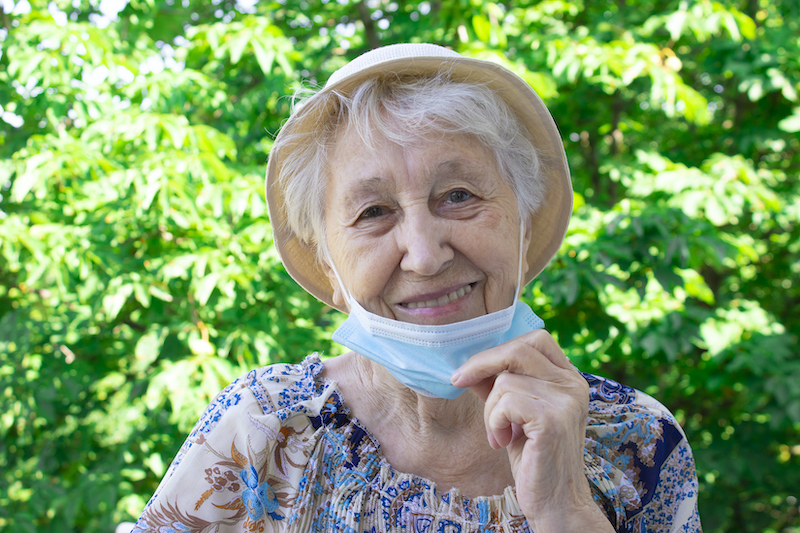During the last several months, we have witnessed tragic losses as well as amazing human resiliency and accomplishment. While the devastating COVID-19 pandemic seems to have lasted forever, as of June 2021, more than 130 million Americans are fully vaccinated. On top of that, about half of the U.S. population has received one dose. However, things are still changing rapidly – including the COVID guidelines for seniors that cover how to go about our daily lives.
What You Can Do Now
As of Summer 2021, 84 percent of people 65 and older have received at least their first dose of the vaccine, and 72 percent are fully vaccinated. This is great news.
According to the Centers for Disease Control and Prevention (CDC), fully vaccinated seniors can begin doing many things that had been halted by COVID-19.
These include resuming activities without wearing a mask or social distancing – except where required by federal, state, local, tribal or territorial laws, rules, and regulations (including local business and workplace guidance).
If you travel within the U.S., you no longer need to be tested before or after travel, or self-quarantine after traveling. You should pay attention to the requirements prior to traveling to an international destination, however.
In addition, you do not need to get tested before leaving the U.S., unless your destination requires it. You do need to show a negative test result or documentation of recovery from COVID-19, however, before boarding an international flight back to the U.S.
You do not need to self-quarantine after arriving in the U.S., but the CDC recommends you should still get tested three to five days after arriving back home.
What to Keep Doing
While COVID news is trending positively, there are still some precautions that must be taken.
When traveling, take steps to protect yourself. You will probably be required to wear a mask on planes, buses, trains, and other forms of public transportation traveling into, within, or out of the U.S. (and in U.S. transportation hubs such as airports and bus/train stations).
Continue to watch out for symptoms of COVID-19, especially if you have recently been around someone who has been sick. Senior adults are the most susceptible to the serious effects of the virus. If you show symptoms, even if you have been vaccinated, you should get tested and stay home, away from others.
How well the vaccines work to protect people with weakened immune systems is still not clear. This includes people that take immunosuppressive medications. Please contact your physician concerning certain chronic or medical conditions that may place you at increased risk.
The CDC’s Summary of Recent Changes (updated May 20, 2021) also recommends updated COVID guidelines for seniors wanting to socialize – avoid large events and gatherings, whenever possible. Indoor events in spaces with poor ventilation pose a higher risk, as do gatherings that last a prolonged period of time. Activities that include singing, shouting, crowding together or the incorrect wearing of masks (or not wearing them at all) also increases risk.
Small, informal gatherings with fully vaccinated family and friends who you see regularly should not involve long distance travel, and therefore pose less of a risk and do not require wearing a mask.
While the risk to fully vaccinated seniors is greatly reduced, there is no way to ensure you have zero risk.
Importance of Vaccination
There is no factual basis for disputing the correlation between the dramatic reduction in COVID-19 cases we are seeing, and the sweeping vaccination program in the U.S. If you, as a senior adult, have not been vaccinated – you are at a far greater risk for the serious consequences of the virus. Eight out of 10 COVID-19 deaths reported in the U.S. have been in people 65 years and older.
Now, it appears that we have safe, effective vaccines to defeat COVID-19. For many, this is the beginning of getting your life back. Protect yourself. Protect others.
Visit our blog for more COVID-19 news, and tips on coping.
Prioritizing Health & Wellness at Bethesda
Whether in independent living, assisted living, memory care, or skilled nursing, Bethesda offers the right amenities, services, programming, and staff to make every day full of purpose for our residents. Contact us to learn about the ways we prioritize health and wellness.
Want to find out more?
If you’d like to stay up to date with Bethesda Health Group, sign up here to receive our blog and newsletters!
"*" indicates required fields
Related Articles
Want to find out more?
If you’d like to stay up to date with Bethesda Health Group, sign up here to receive our blog and newsletters!
"*" indicates required fields



